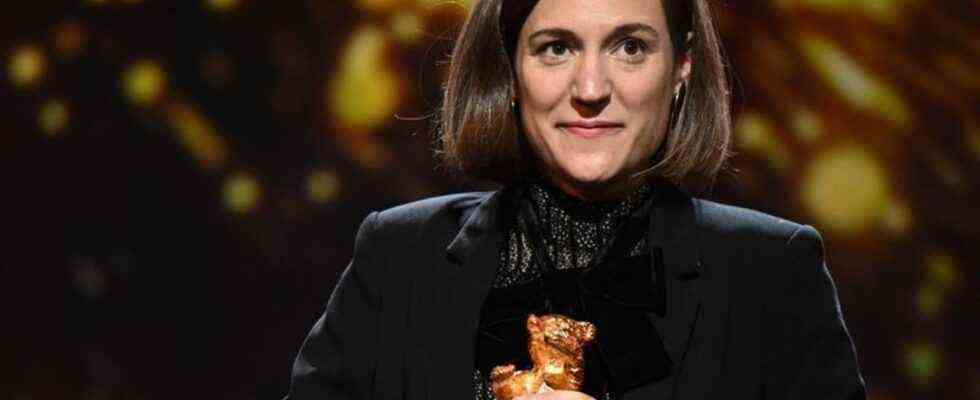film awards
Berlinale 2022: Film festival honors “Alcarràs”.
The Spanish director Carla Simón with the Golden Bear for the drama “Alcarràs” Photo: Monika Skolimowska/dpa-Zentralbild/dpa
© dpa-infocom GmbH
Director Carla Simón tells the story of a family that runs a peach plantation. Her film «Alcarràs» wins the Golden Bear at the Berlinale.
The film tells of the everyday life of a family that grows peaches on a plantation and finds themselves in dire straits. Because solar panels are suddenly to be built on the site.
The drama «Alcarràs» by Spanish director Carla Simón has won the Golden Bear at the Berlinale. The jury also honored Meltem Kaptan in Berlin. The actress, who lives in Cologne, received the festival’s most important acting prize.
The comedienne plays the main role in «Rabiye Kurnaz vs. George W. Bush». The film tells how Murat Kurnaz’s mother tries to free her son from the US Guantánamo prison camp. The film’s screenwriter, Laila Stieler, also won a Silver Bear. The production by director Andreas Dresen (“Gundermann”) received two awards.
For the first time in a German cinema film
Kaptan thanked her family. “Mom and Dad, you came here so many years ago,” said the 41-year-old on Wednesday evening. ‘And you didn’t ask your daughters to study medicine or law. Instead you said: “Follow your path.”» They would have done that with unconditional love. “And just thank you for that.”
She dedicated her prize to Rabiye Kurnaz and all mothers whose love is stronger than all borders. In her film role, she shows quick wit, humor and, above all, self-mockery. Kaptan has had television appearances with “Ladies Night” and can now be seen in a German cinema film for the first time. The film is scheduled to open at the end of April. The second German directorial work in the competition went empty-handed: “AEIOU – The Fast Alphabet of Love” by Nicolette Krebitz.
How the Berlinale can take place this time had been discussed for a long time. “It was the right decision to let the Berlinale take place live despite the pandemic,” said Minister of State for Culture Claudia Roth (Greens). The risk was taken for the love of film. “The film and the cinema as a whole won.” Under difficult circumstances, the Berlinale has once again shown its stance “as the most political” of the major international film festivals.
No kisses because of Corona
The schedule has been changed due to the pandemic. This time the prizes were awarded earlier than usual – several public days are now planned until Sunday. Special rules apply when going to the cinema. At the award ceremony, too, the guests sat in the hall at a distance from each other. “Unfortunately, no kisses here today,” said moderator Hadnet Tesfa when director Ruth Beckermann (“Mutzenbacher”) received an award from the Encounters series. “No kisses here today?” Beckermann asked back. “Oh well.”
The jury president for the main awards was US director M. Night Shyamalan (“The Sixth Sense”). The jury evaluated a total of 18 entries in the competition. The French Claire Denis was awarded for the best direction: In “Avec amour et acharnement” Juliette Binoche plays a woman whose life gets mixed up when an ex-partner turns up again. The Grand Jury Prize went to Hong Sangsoo’s “The Novelist’s Film” in which an author meets different people.
The drama «Robe of Gems» by director Natalia López Gallardo won the Jury Prize. The film shows three women in Mexico who get into trouble with the drug business. The collage “Everything Will Be Ok” by Cambodian Rithy Panh was honored for a special artistic achievement. The film cuts together a civilization-critical collage from animation and documentary film images.
Personally and politically
Alongside Cannes and Venice, the Berlinale is one of the world’s major film festivals. Since last year, the acting prizes have no longer been awarded separately according to gender, but for the best performance in leading and supporting roles. The Silver Bear for Best Supporting Actor went to Laura Basuki for the Indonesian story “Nana”. A EUR 50,000 award for the best first film was also presented – the prize went to “Sonne” by Kurdwin Ayub (“I hope the taxes don’t take my money away from me”).
Many films this year managed to tell political backgrounds with personal stories. It is the same with the drama «Alcarràs», which won the Golden Bear. The film tells the story of a family who runs a peach plantation in Catalonia. It looks idyllic at first: the adults work on the farm, the children play.
But then there is a risk of losing the land, because generations ago the right to cultivate it was only sealed with a handshake. Now solar panels are to be set up there. In addition, the farmers can hardly live on the earnings from their work anyway. The loud labor dispute also affects the family.
Director Simón calmly shows everyday family life between work and leisure. She subtly refers to the value of respectful, careful interaction with one another. At the same time, it reflects how seemingly private matters are shaped by social circumstances. The drama thus becomes a multi-faceted portrait of society that denounces the power of greed for profit. Her family grows peaches themselves, Simón said. That’s why the world is so close to her. She wants to dedicate the award to the small families of farmers “who till the soil every day so that we have food on the table”.

